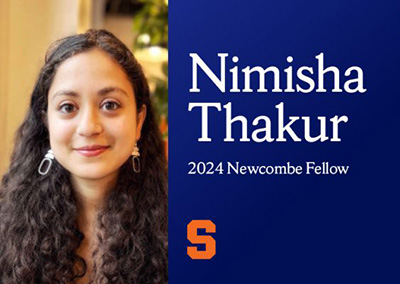PhD Candidate in Anthropology Receives Newcombe Fellowship for Doctoral Research in India
June 12, 2024
SU News
Nimisha Thakur, a Ph.D. candidate in the Department of Anthropology in the Maxwell School of Citizenship and Public Affairs, has received a Charlotte W. Newcombe Doctoral Dissertation Fellowship. Administered by the Institute for Citizens & Scholars, the Newcombe Fellowship supports promising scholars completing dissertations examining ethics and religion in interesting, original or significant ways. Fellows receive a 12-month award of $31,000 to support their final year of dissertation writing.

Thakur is one of 22 scholars in the United States to receive the award, which the Woodrow Wilson National Fellowship Foundation calls the largest and most prestigious award for Ph.D. candidates in the humanities and social sciences addressing questions of ethical and religious values.
Funded by the Charlotte W. Newcombe Foundation, the fellowship was created in 1981 and has supported nearly 1,300 doctoral candidates. Newcombe Fellows have gone on to be noted faculty at domestic and foreign institutions, leaders in their fields of study, Pulitzer Prize winners and more.
Thakur’s dissertation, “River song: Riverine ethics and autonomy on the Brahmaputra floodplains,” focuses on the ethical actions shaping the lives of people inhabiting the floodplains of the Brahmaputra River in Assam, India, as they build a future amidst socio-economic, political and environmental precarity.
When Thakur began preliminary research in 2017, she followed the flows of the Brahmaputra River and its many tributaries in upper and central Assam. “This helped me understand how a mobile approach to land and life allows local communities across the Brahmaputra floodplains to deal with the uncertainties posed by climate change and infrastructures upstream,” Thakur says. “I specifically focus on how place-based ethics and ancestral values centering an autonomous mode of life emerge in narratives about a future for riverine communities living in small river islands on the Brahmaputra River’s northern bank.”
From 2021-22, Thakur explored riverine communities’ relationships with the Brahmaputra River and its tributaries through songs, stories and participation in everyday life while living in the river island region. She also interviewed activists and community leaders to understand their perspectives around development infrastructures that adversely impact community access to land and resources. She also conducted research at several archives in India.
“Nimisha’s research is fascinating, timely and important, and I enjoyed working with her to hone her application materials,” says Daniel Olson-Bang, director of professional and career development in the Graduate School. “I’m so pleased that such a deserving researcher will have this opportunity.”
Thakur’s research was supported by the American Institute of Indian Studies Junior Dissertation Fellowship from 2021-22. She also received support from the Department of Anthropology and the Moynihan South Asia Center in the Maxwell School of Citizenship and Public Affairs and the Education Model Program on Water-Energy Research, a National Science Foundation Graduate Research Traineeship Program at Syracuse University.
By Kelly Homan Rodoski
Published in the Fall 2024 issue of the Maxwell Perspective
Related News
School News

Dec 19, 2024
School News

Dec 13, 2024
School News

Dec 11, 2024
School News

Dec 10, 2024